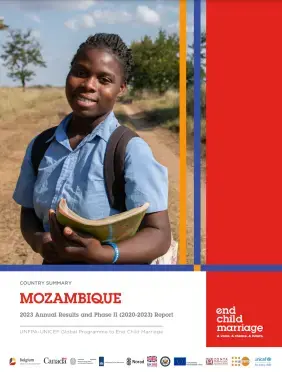The UNFPA-UNICEF Global Programme to End Child Marriage (the Global Programme; also referred to in this report as ‘the Programme’), a 15-year programme (2016–2030), aims to accelerate action to end child marriage in alignment with Sustainable Development Goal (SDG) target 5.3. The Global Programme targets adolescent girls (ages 10–19) at risk of child marriage or already in a union in 12 focus countries with a high prevalence or high burden of child marriage: Bangladesh, Burkina Faso, Ethiopia, Ghana, India, Mozambique, Nepal, Niger, Sierra Leone, Uganda, Yemen and Zambia. In Mozambique, the Global Programme has effectively empowered girls to make informed decisions about marriage and their sexual and reproductive health, thereby transforming their knowledge, context, and environment. The 2023 Phase II independent evaluation concluded that the Global Programme increased the knowledge and skills of targeted adolescent girls at risk of, and affected by, child marriage, equipping them to make informed decisions and choices regarding marriage, education, and sexual and reproductive health. The Global Programme facilitated access to comprehensive sexuality education and life skills education for both in- and out-of-school girls. In some cases, this was combined with economic empowerment interventions designed to mitigate poverty drivers of child marriage.
The UNFPA-UNICEF Global Program to End Child Marriage is generously funded by the Governments of Belgium, Canada, Italy, the Netherlands, Norway, the United Kingdom, the United States of America, and the European Union through the Spotlight Initiative and Zonta International.


